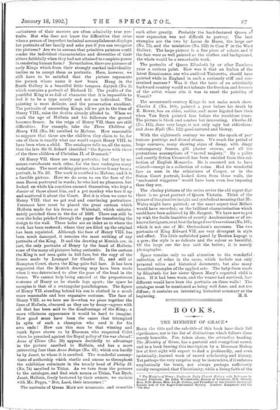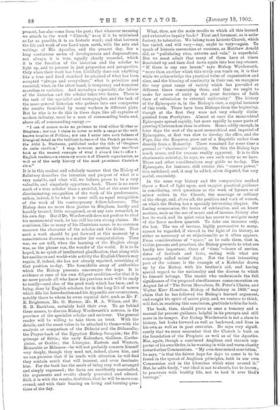B 0 0.K S.
THE MINISTRY OF GRACE.*
B.0TH the title and the sub-title of this book have their full significance, nor is the list of. distinctions which follows them merely honorific. For, taken alone, the attractive heading, The ?Ministry of Grace, has a pastoral and evangelical sound, and in a book bearing this inscription by a Diocesan Bishop few at first sight will expect to find a profoundly, and even technically, learned work of sacred scholarship and history. Yet perhaps the very surprise may be instructive, if it enforces emphatically the truth, not always perhaps sufficiently vividly recognised, that Christianity, while a living faith of the • The Ministry of Grace Studies in Early Church History with Refe.:ence to Present Problems. By John Wordsworth, Bishop of Salisbury, D.D. Oxford, Hon. DJ). Berne Hon. LL.D. Dublin, and President of the chores giscorical Society and of the Angie-continental Society. London: Longrunns and Co. The nortraits of Queen Mary are numerous. and rexe.mble ma se.?
present, has also come from the past; that whatever meaning we attach to the word "Church," even if it be minimised
as far as possible, it is an historic word; and that between
the life and work of our Lord upon earth, with the acts and writings of His Apostles, and the present day, lies a long continuous series of developments and dispensations, not always, it is true, equally clearly recorded, which it is the function of the historian and the scholar to light up, and to present in just proportion and perspective.
Only when their work has been faithfully done can anything like a true and fixed standard be attained of what has been accepted "always and everywhere," what is primitive and essential, what, on the other hand, is temporary and transient accretion or variation. And nowadays especially, the labour of the historian and the scholar takes two forms. There is the task of the specialist and monographer, and the task of the more general historian who gathers into one conspectus the results furnished by many workers in different plots. But he who is to do this in these days, like all captains of modern industry, must be a man of commanding brain and, above all, of commanding energy :—
"I can of course make no pretence to rival either Hooker or Bingham ; nor can I claim to cover so wide a range as the well- known treatise of Pellicia; nor can I enter into such fulness of liturgical detail as the brilliant lectures of the French profes,or, the Abb6 L. Duchesne, published under the title of Origines du cuIte chretien.' I may, however, mention that excellent book as the nearest example of what I shou'd like to offer t Englibh readers,—a summary accouat of Church organisation, as well as of the early history of the most prumineat Christian rites."
It is in this modest and scholarly manner that the Bishop of Salisbury describes the intention and purport of what is a very notable, and what will, we believe, prove to be a very valuable, and singularly opportune, book. There is no surer mark of a true scholar than a grateful, but at the same time discriminating, recognition of the work of his predecessors, unless, indeed, it be what is rarer still, an equal recognition of the work of his contemporary fellow-labourers. The Bishop does no more than justice to Bingham, hardly and harshly treated, little recognised, or at any rate rewarded, in his own day. But if Dr. Wordsworth does not profess to rival his monumental work, he has still his own strong claims. He combines, like so many of his illustrious name, in no common measure the character of the scholar and the divine. That such a work should be put forward at this moment by a conscientious diocesan is a matter for congratulation. Time was, we are told, when the learning of the English clergy was, as the phrase ran, the wonder of the world. It is to be hoped, in no spirit of intellectual glorification, that along with her assiduous and world-wide activity the English Church may regain, if, indeed, she has not already regained, something of that position to-day. The formidable array of authorities which the Bishop presents encourages the hope. It is evidence at once of his own diligent erudition—for that it is no mere parade all who know his previous work will be ready to testify—and also of the good work which has been, and is being, done by English scholars, for in the long list of names which fills his Introduction and his Appendix our countrymen, notably those to whom he owns especial debt, such as Mr. F. E. Brightman, Mr. G. Horner, Mr. H. A. Wilson, and 311., R. B. Rackham, certainly hold their own. To go behind these names, to discuss Bishop Wordsworth's sources, is the province of the specialist scholar and reviewer. The general reader will be willing to take them on trust. With the details, and the exact value to be attached to them—with the analysis or comparison of the Didache and the Didascalia ; the Prayer-book of the Egyptian Bishop Sarapion ; the Pil- grimage of Silvia ; the early Kalendars, Gallium. Cartha- ;inian, or Gothic; the Liturgies, Eastern and Western, Mozarabic or Milanese—he will not probably concern himself very deeply, though they need not, indeed, alarm him, and we can promise that if he reads with attention he will find they contain much that will interest, and even fascinate, him. For the book has the merit of being very well arranged and simply expressed ; the facts are excellently marshalled, the arguments and results clearly presented and educed. Still, it is with the results, doubtless, that he will be more con- cerned, and with their bearing on living and burning ques- tions of the day.
What, then, are the main results to which all this learned and exhaustive inquiry leads ? First and foremost, as is satis- factory, to toleration. We belong to an historic Church, which has varied, and will vary—nay, ought to vary—again. To speak of historic ceremonies or customs, as Matthew Arnold did, as " pullulating rites, externe and vain," is superficial. But we . must admit that many of them have at times flourished up and then died down again into less importance. "If there is any one lesson," says Bishop Wordsworth, "more than another which this study can teach us, it is that while we acknowledge the practical value of organisation and rites, and the blessing of continuity in their use, we recognise the very great range of variety which has prevailed at different times concerning them, and that we ought to make far more of unity in the great doctrines of faith than of submission to external uniformity." The history of the Episcopate is, in the Bishop's view, a capital instance of this truth. There have been Bishops from the beginning, though at the first they were not very clearly distin- guished from Presbyters. Almost at once the monarchical Episcopate spread rapidly, but more rapidly in some parts of growing Christendom than in others. Rome, oddly enough, in later days the seat of the most monarchical and imperial of Episcopates, at first was slow to develop the office, and the Pope, like the Emperor, grew out of a Republic rather than directly from a Monarchy. There remained for some time a general or " charismatic ' ministry. On this the Bishop lays much stress, and for reasons readily apparent. It is to this charismatic ministry, he says, we owe such unity as we have. These and other considerations may guide us to-clay. The Episcopate, for instance, still retains this "reserve power," this undefined, and, it may be added, often disputed, but very useful, suzerainty.
In the same way history and the comparative method throw a flood of light upon, and suggest practical guidance in considering, such questions as the work of laymen or of minor orders in the Church, the marriage or celibacy of the clergy, and, above all, the position and work of women, on which the Bishop has a specially interesting chapter. On Lasting communion, th3 hours of celebration, and on lesser matters, such as the use of music and of incense, history also has its word, and its quiet voice has power to mitigate many of the fierce modern quarrels To take one instance only, the last. The use of incense, highly provocative to many, cannot be regarded, if viewed in the light of its history, as either so necessary or so objectionable as it often appears. From considerations of "space," as he calls them, that is, visible persons and practices, the Bishop proceeds to what are hardly less important, those of "time,"—hours of service, dates of festivals and fasts, ending with what are commonly called saints' days. Not the least interesting part of the volume is the example of a Kalendar drawn up by the Bishop with his brother's aid, and having special regard to the nationality and the diocese to which he himself belongs. The reader who understands the full significance of the proposed simultaneous commemoration on August 1st of "The Seven Maccabees, St. Peter's Chains, and Walter Kerr Hamilton, Bishop of Salisbury in 1869," may claim that he has followed the Bishop's learned argument, and caught his spirit of active piety, and, we venture to think, will feel, in reaching this conclusion, gratitude to him for both.
The book, then, should prove at once a treasury and a manual for present guidance, helpful in its precepts and still more in its temper. For Bishop Wordsworth is not a slave to history, but looks forward as well as backward, and lives in his own as well as in past centuries. He says very signifi. cantly that we must remember that the Church is built on the foundation of the Prophets as well as of the Apostles. Nor, again, though a convinced Anglican and staunch sup- porter of his own Order, is he wanting in wide and warm charity toward other Communions. "My own determined conviction,' lie says, "is that the fairest hope for days to come is to be found in the spread of Anglican principles, both in our own Communion and in the Churches which exist around it." But, he adds finely, "our ideal is not to absorb, but to leaven ; to penetrate with healthy life, not to lord it over God's heritage."







































 Previous page
Previous page